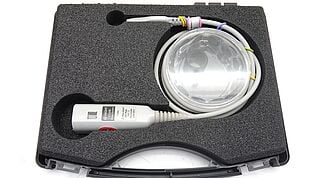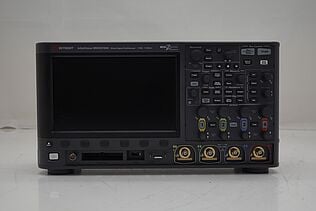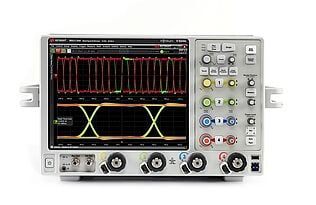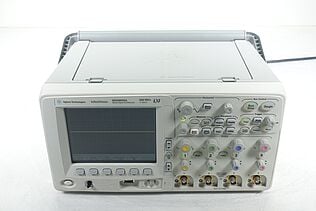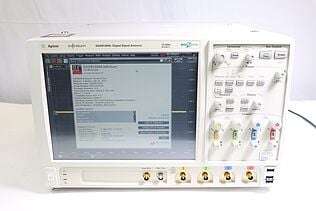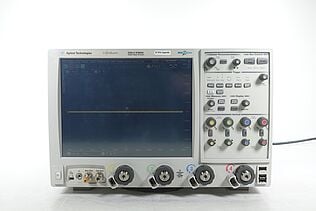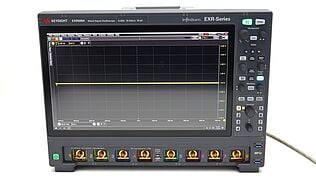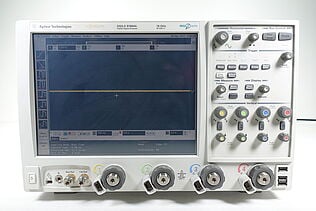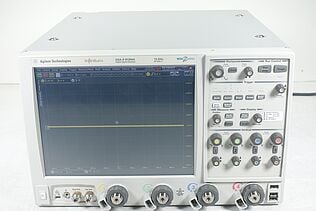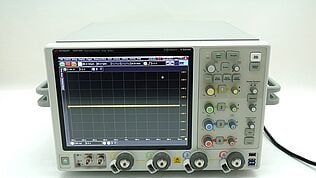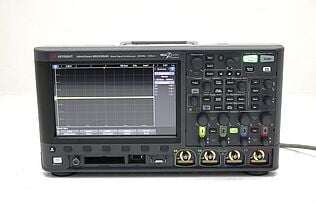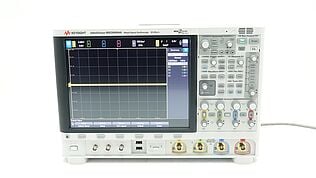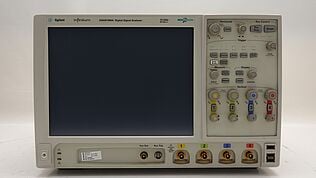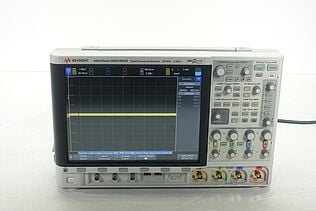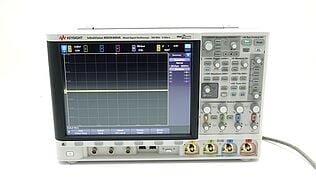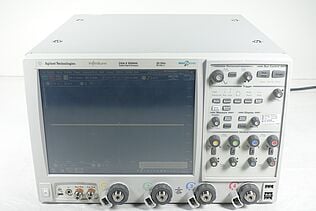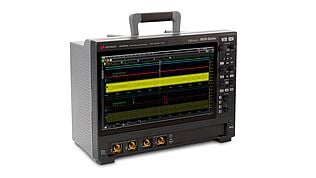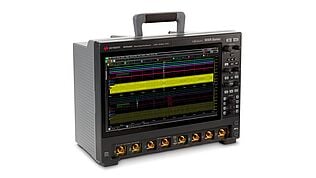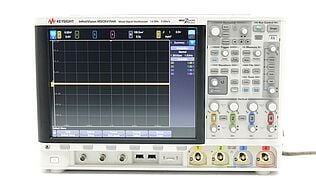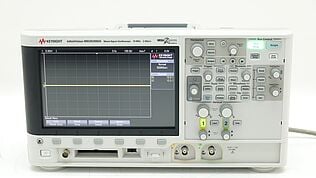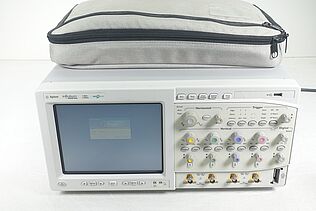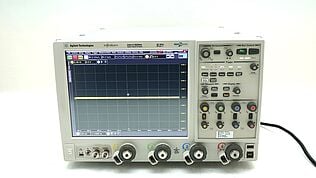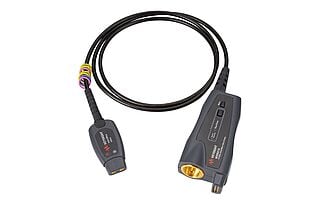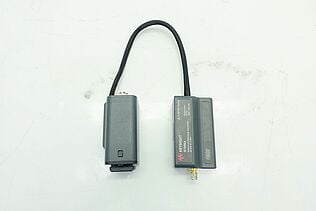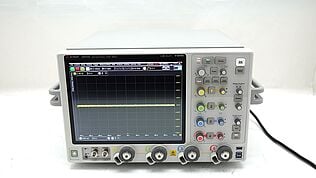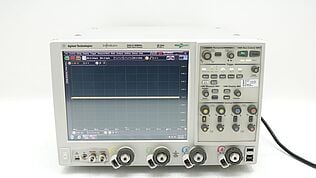- How Do Expensive and Budget Oscilloscopes Differ?
- The Main Characteristics of Oscilloscopes
- Best Entry Level Oscilloscopes
- How to Choose an Oscilloscope
- What Is the Most Important Specification?
- Why Are Oscilloscopes So Expensive?
- Factors to Consider
- Horizontal and Vertical Sensitivity Range
- Frequently Asked Questions
- Keysight Oscilloscopes
- Popular Used Oscilloscopes
How Do Expensive and Budget Oscilloscopes Differ?
In this article, we will take a look at the main differences between expensive and budget oscilloscopes. We will also discuss the most important specifications and parameters to look for in an entry-level oscilloscope. Let's take a brief look at some differences between the bandwidths, sample rates, and channels of budget oscilloscopes and expensive oscilloscopes.
| Budget Oscilloscopes | Expensive Oscilloscopes |
|---|---|
| Bandwidths between 20MHz and 60MHz | Bandwidths up to 1.5 GHz |
| Sample rates between 1GS/s and 2.5GS/s | Sample rate up to 4GSa/s |
| 2 digital channels | 4 analog and 16 digital channels |
As the table shows, there are some big differences in parameters between budget and high-end oscilloscopes. So it's important to consider your needs carefully before making a purchase.
Buy Oscilloscopes at a Great Discount
The Main Characteristics of Oscilloscopes
There are many different types of oscilloscopes, but they all have one thing in common: they allow you to see a signal over time. This makes them very useful for analyzing and troubleshooting circuits.
Oscilloscopes usually have two main parts:
- Visualization. This LED or LCD screen is responsible for displaying the signal.
- The controller. This allows you to control the various settings of the scope.
Most oscilloscopes have two channels, which means they can display two different signals at the same time. Some higher-end models have eight or more channels.
The main specifications of an oscilloscope are bandwidth, sample rate, and the number of channels. We will look at these three specifications in detail later in the article. When choosing an oscilloscope, it is important to consider what you need. Make sure the oscilloscope has enough bandwidth and sample rate for your purposes. And if you need to measure multiple signals simultaneously, you will need an oscilloscope with enough channels.
Best Entry Level Oscilloscopes
If you are just starting in electronics, you will need an oscilloscope with basic features. Some excellent entry-level oscilloscopes on the market include the Keysight MSOX3022A mixed signal oscilloscope. With 16 digital and 2 analog channels, a 100 MHz bandwidth, and a 4GSa/s Max sample rate, it's a stand-out option for those on a budget.

Or suppose you are looking for something with a little more bang for your buck. In that case, the Keysight InfiniiVision MSOX2024A offers a flexible Bandwidth within a range of 70 MHz to 200 MHz, 8 input channels, and a memory depth of 1 Mpt/channel. It also has high-speed update rates with up to 200,000 waveforms per second.
Both of these models are very affordable and offer excellent performance for their price.
How to Choose an Oscilloscope
Choosing an oscilloscope can be difficult, especially if you are new to electronics. There are many different types and models on the market with a wide range of parameters, and it can be hard to know which one is right for you.
Here are some things to consider when choosing an oscilloscope:
- What is your budget?
- What are your needs?
- What is your level of experience?
After you have answered those questions, there are several other things you need to keep in mind:
- Decide what type of signals you need to measure.
- Consider the bandwidth and sample rate that you need.
- Decide on how many channels you need.
If you only need to measure low-frequency signals, then a low-end oscilloscope will be sufficient. However, if you need to measure high-frequency signals, you will need a scope with a higher bandwidth and sample rate.
Now, if you need to measure multiple signals simultaneously, make sure that the oscilloscope has enough channels. With these few tips in mind, you should be able to choose the right oscilloscope for your needs.

What Is the Most Important Specification?
It can be daunting to understand what you need when choosing the right oscilloscope! So what are the most important things to look for in an entry-level oscilloscope? Let's look at four things to look for when buying an oscilloscope:
- Make sure that the digital scope has enough bandwidth for your needs. Bandwidth is the most important specification to consider when choosing an oscilloscope. Bandwidth defines the maximum frequency that the scope can accurately capture. The higher the bandwidth, the more expensive the scope will be.
- Consider what sampling rate you need. The sample rate defines how many samples per second the scope can take. Meaning, that the higher the sampling rate, the more detail you will be able to see in your waveform. Again, the trade-off here is that a higher sample rate will cost more money.
- Decide how many channels you will need to have. The number of channels defines how many signals the scope can display simultaneously. If you only need to measure one signal at a time, then a single-channel scope will be enough. However, if you need to measure multiple signals simultaneously, you will need a scope with more channels.
- Check if the digital scope comes with any built-in waveform signal generators. Waveform generators allow you to create signals to test your circuits. Not all entry-level oscilloscopes come with waveform generators, so if this is a feature you need, check for it before buying.
Why Are Oscilloscopes So Expensive?
Oscilloscopes are expensive because they use many electronic components and require a lot of precision in their manufacture. They also have to be able to accurately measure high-speed signals, which requires high bandwidth. For example, a scope with a bandwidth of 100 MHz can cost several thousand dollars. A lower-end scope with a bandwidth of 20 MHz may only cost a few hundred dollars.
Factors to Consider
As we have looked at, oscilloscopes are very useful tools with many different features. There are also some advantages and disadvantages to consider when purchasing.
| Advantages | Disadvantages |
|---|---|
| Allows you to see a signal over time | Signal noise from other electrical circuits |
| Can measure high-frequency signals precisely | Can be complicated to understand if you are just starting out |
| High-end storage memory | Can be pretty costly if you need higher-end specifications |
| Has an LCD screen which makes it easy to read | Some oscilloscopes are not portable |
Despite some disadvantages, oscilloscopes are still very useful tools for measuring electrical signals. If you need to measure high-frequency signals or if you need to troubleshoot circuits, an oscilloscope is still your go-to!
Horizontal and Vertical Sensitivity Range
The vertical sensitivity range defines the minimum and maximum voltage the scope can measure. The horizontal range defines the minimum and maximum time interval that the scope can measure. This is important because it defines the level of detail that the oscilloscope can capture.
For example, a scope with a horizontal range of 1 ns can measure signals with a time resolution of 1 nanosecond. This is important for measuring high-speed signals.
Frequently Asked Questions
What Is Vertical Sensitivity Control?
The vertical sensitivity control is used to set the voltage scale of the oscilloscope. This is important because it allows you to see small voltage signals that would otherwise be difficult to detect.
For example, if you are measuring a signal with an amplitude of 1 volt, you can use the vertical sensitivity control to increase the voltage scale so that the signal is easier to see.
What Is Time Base Control?
The time base control is used to set the time scale of the oscilloscope. It allows you to analyze slow or fast signals.
If you are measuring a signal with a frequency of 1 kHz, you can use the time base control to increase the time scale to make the signal easier to read.
What Is Maximum Input Voltage?
The maximum input voltage is the highest voltage that the scope can safely measure without damaging it.
If you are trying to measure a signal with an amplitude of 10 volts, you need to ensure that the scope has a maximum input voltage of at least 10 volts.
Browse Oscilloscopes at a Great Discount
Select up to 3 instruments to compare
Enable Notifications
In order to use this feature, you need to enable notifications.
Manage notification preferences
Keysight Oscilloscopes
As we have looked at, oscilloscopes can differ significantly in their ranges and specifications. It is important to know what basic parameters you need if you are in the market for a budget oscilloscope. This will ensure that you get the best scope for your budget. Once you have these things in mind and know what oscilloscope you are looking for, visit Keysight Used Equipment to see a wide range of oscilloscopes to find the right one to fit your needs.

Subscribe to Get Our Latest News, Updates, and Articles.
Popular Used Oscilloscopes
Keysight Used Oscilloscopes offers a wide range of industry leading pre-owened oscilloscopes, ranging from older generation Agilent oscilloscopes to the newest Keysight oscilloscope models. So whether you are a fist time buyer, replacing a model like-for-like or looking for upgrade – we have something for you.
